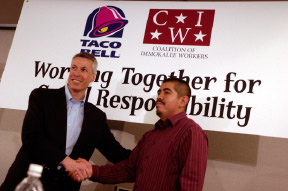On March 8, 2005, representatives of Taco Bell and its parent company Yum Brands (the world’s largest restaurant company) held a joint press conference with representatives of the Coalition of Immokalee Workers at Yum Brands headquarters in Louisville, Kentucky. At that press  conference, Yum Brands Vice President Jonathan Blum (left, with Lucas Benitez of the CIW) announced that Yum had signed an historic agreement to “work with the CIW to improve working and pay conditions for farmworkers in the Florida tomato fields.”
conference, Yum Brands Vice President Jonathan Blum (left, with Lucas Benitez of the CIW) announced that Yum had signed an historic agreement to “work with the CIW to improve working and pay conditions for farmworkers in the Florida tomato fields.”
After nearly four years of a tenacious and growing boycott, Taco Bell and Yum Brands finally agreed on March 8th to “take a leadership role within our industry… and work with the CIW for social responsibility.” In return, we ended our four-year boycott of Taco Bell.
Yum’s decision to meet our precedent-setting demands – a decision made following several weeks of intense negotiations, just as the fourth annual “Taco Bell Truth Tour” hit the road for a week of protests at Yum Brands headquarters in Louisville — was greeted as an historic achievement by  observers from former President Jimmy Carter to former guitarist for Rage Against the Machine, Tom Morello, who said of the agreement, “This is a major victory for the workers and demonstrates that by standing up and standing together, we can overturn any injustice. By standing up and standing together, we can change the world.”
observers from former President Jimmy Carter to former guitarist for Rage Against the Machine, Tom Morello, who said of the agreement, “This is a major victory for the workers and demonstrates that by standing up and standing together, we can overturn any injustice. By standing up and standing together, we can change the world.”
The CIW-Yum agreement sets several important precedents, establishing:
• The first-ever direct, ongoing payment by a fast-food industry leader to farmworkers in its supply chain to address sub-standard farm labor wages (nearly doubling the percentage of the final retail price that goes to the workers who pick the produce);
• The first-ever enforceable Code of Conduct for agricultural suppliers in the fast-food industry (which includes the CIW, a worker-based organization, as part of the investigative body for monitoring worker complaints);
• Market incentives for agricultural suppliers willing to respect their workers’ human rights, even when those rights are not guaranteed by law;
• 100% transparency for Taco Bell’s tomato purchases in Florida (the agreement commits Taco Bell to buy only from Florida growers who agree to the pass-through and to document and monitor the pass-through, providing complete records of Taco Bell’s Florida tomato purchases and growers’ wage records to the CIW).
The details of the agreement can be separated into two broad categories: 1) Improving farmworker wages, and 2) Progress toward equal rights for farmworkers:
[wpcol_1half id=”” class=”” style=””]
Improving Farmworker Wages
* Taco Bell will pay 1 cent more per pound for all tomatoes it buys – for both corporate-owned and franchise stores – from Florida growers. Given that workers today receive roughly 1.3 cents per pound (40-45 cents for every 32-lb bucket), the raise amounts to an increase of roughly 75% for workers picking tomatoes for Taco Bell;* Taco Bell will buy only from growers who pass the penny per pound on to their workers;
* Taco Bell will establish a monthly monitoring process with the CIW to track and enforce the “pass-through” payment;
* Growers who fail to pass the penny through to their workers will lose their right to do business with Taco Bell;
* Taco Bell and Yum Brands will work with the CIW in efforts to convince the Florida Tomato Committee to institute an industry-wide, penny per pound surcharge on all buyers of Florida tomatoes so that the wage increase established here for workers who pick tomatoes for Taco Bell may be extended to all Florida tomato pickers
[/wpcol_1half]
[wpcol_1half_end id=”” class=”” style=””]
Progress Toward Equal Rights for Farmworkers
* Yum has agreed to add the following statement to their General Supplier Code of Conduct:
“Supplemental Policy Statement for Florida Tomato Growers
YUM suppliers are required to abide by all applicable laws, codes and regulations, including, but not limited to, any local, state or federal laws regarding wages and benefits, working hours, equal opportunity, and worker and product safety. In addition, YUM strongly encourages Florida growers in the tomato industry to provide working terms and conditions similar to those provided by suppliers outside of the agricultural industry, and will conduct business with those tomato growers that demonstrate consistent adherence to these higher standards.
In the event YUM and/or the Coalition of Immokalee Workers (“CIW”) receives a credible complaint* from a tomato picker alleging conduct by a Florida tomato grower that violates any applicable laws, codes or regulations as specified above, YUM and CIW will work together to investigate the complaint with no undue delay, and if it is determined that there are reasonable grounds to believe that a violation has occurred, YUM may revoke a supplier’s approved status. YUM and CIW will also jointly refer the complaint to the applicable state enforcement agencies. If the applicable enforcement agency determines that a violation has occurred, and YUM and CIW determine that the violation was serious or systemic, YUM will revoke a supplier’s approved status until such time that the supplier remedies the situation to the satisfaction of YUM and CIW; provided that YUM shall have a reasonable time to transition purchases from that supplier to provide for sufficient supply of tomatoes for its business.
* A credible complaint – the complaint cannot be anonymous (but can protect anonymity) and through a description of the facts indicate how relevant laws, codes or regulations have been violated.”
* Other additions to the Yum Code of Conduct include a strict prohibition against indentured servitude, a right to unannounced inspections of their suppliers operations, and enforcement consequences for violations of provisions of the Code of Conduct.
* Yum and Taco Bell will work together to lobby the Florida legislature and governor for laws guaranteeing tomato workers the same rights, protections, and privileges that other non-agricultural workers enjoy.
[/wpcol_1half_end]
What do the wage provisions of this agreement mean for workers?
 Clearly, Taco Bell is only one major buyer of many. As such, the penny more per pound will not have an immediate impact on all workers across the entire tomato industry.
Clearly, Taco Bell is only one major buyer of many. As such, the penny more per pound will not have an immediate impact on all workers across the entire tomato industry.
But this agreement represents the first time – ever — that a fast-food leader has agreed to address directly the sub-poverty wages paid to farmworkers in its supply chain. This seminal agreement establishes real accountability at the top of the agri-food market for the wages of those who toil at the bottom of the industry, the farmworkers who pick this country’s crops. In so doing, it charts a path that will certainly be traveled by many more workers in the years to come whose wages are currently squeezed by the unprecedented buying power of the fast-food and supermarket giants like McDonalds, Subway, and WalMart.
In the words of CIW member Rolando Sales, “This change isn’t just for us, it’s for everyone. We should be respected and treated as human beings with rights just as any others.”
The amount of the increase is significant as well. While one penny may sound minimal on the surface, those who know something about agricultural markets know that shares are defined by cents on the pound and battles are fought over a penny every day between growers, brokers, and buyers. So, for workers picking tomatoes for Taco Bell, that penny more per pound will be a meaningful increase. It will also set a valuable base line for future agreements with other leaders of the fast-food and supermarket/retail industries.
 Finally, the penny pass-through agreement guarantees — for the first time – that Taco Bell’s Florida tomato supply chain will be 100% transparent. Florida has been called “ground zero for modern-day slavery,” yet the murky nature of the tomato market has thus far successfully thwarted any efforts to trace tomatoes picked by forced labor to the corporations that bought and distributed them. That will no longer be the case for tomatoes bought by Taco Bell. The next time a slavery case arises in Florida, there will be a mechanism in place to ensure that Taco Bell does not purchase those tomatoes, even inadvertently.
Finally, the penny pass-through agreement guarantees — for the first time – that Taco Bell’s Florida tomato supply chain will be 100% transparent. Florida has been called “ground zero for modern-day slavery,” yet the murky nature of the tomato market has thus far successfully thwarted any efforts to trace tomatoes picked by forced labor to the corporations that bought and distributed them. That will no longer be the case for tomatoes bought by Taco Bell. The next time a slavery case arises in Florida, there will be a mechanism in place to ensure that Taco Bell does not purchase those tomatoes, even inadvertently.
What do the provisions on labor rights signify for workers?
As Yum Brands Vice President Jonathan Blum said at the press conference announcing the agreement, “We recognize these workers do not enjoy the same rights and conditions as employees in other industries, and there is a need for reform.”
Farmworkers rights today are diminished in two significant ways: first, by the failure to enforce those rights which farmworkers are legally guaranteed, and second, by the exclusion of farmworkers from many of the fundamental labor rights guaranteed to other US workers, including the right to organize and the right to overtime. This agreement addresses both of those aspects in a first step toward ensuring equal rights for farmworkers. It does so by harnessing the very market power that the mega-corporations have used to drive down supplier prices, only in this case that power is being used by Yum Brands as an incentive for suppliers to improve working conditions for their employees.
The Supplemental Policy Statement for Florida Tomato Growers sets several important new standards for social responsibility with respect to farm labor rights in the fast-food industry. First, it defines clear enforcement consequences to guarantee the respect of those rights guaranteed by law to farmworkers by law in Yum’s tomato supply chain. Second, it establishes a straightforward investigative mechanism to monitor compliance with those rights, one which explicitly includes the CIW in the investigative process when workers’ complaints arise. And third, it places the CIW, a worker-based organization, firmly in the decision-making process with regard to enforcement of those rights.
 Finally, the statement establishes a new concept in the agri-food market, that of an incentive to recognize “aspirational rights” for Florida farmworkers, workers who have been excluded from many of the fundamental labor rights enjoyed by other American workers for nearly a century. While the statement does not require Yum’s suppliers to respect those rights – Yum’s power as a major buyer does not extend to demanding that its suppliers surpass the current legal requirements – it does guarantee that if a supplier were to move in that direction, it would have a market for its tomatoes, even if the tomatoes cost a bit more due to the suppliers’ adherence to those higher standards.
Finally, the statement establishes a new concept in the agri-food market, that of an incentive to recognize “aspirational rights” for Florida farmworkers, workers who have been excluded from many of the fundamental labor rights enjoyed by other American workers for nearly a century. While the statement does not require Yum’s suppliers to respect those rights – Yum’s power as a major buyer does not extend to demanding that its suppliers surpass the current legal requirements – it does guarantee that if a supplier were to move in that direction, it would have a market for its tomatoes, even if the tomatoes cost a bit more due to the suppliers’ adherence to those higher standards.
In summary
 Lucas Benitez, an elected leader of the CIW, said at the March 8 press conference: “Human rights are universal, and if we as farmworkers are to one day indeed enjoy equal rights, the same rights all other workers in this country are guaranteed, this agreement must only be a beginning. To make those rights truly universal, other leaders of the fast-food industry and the supermarket industry must join us on this path toward social responsibility. With a broad coalition of industry leaders committed to these principles, we can finally dream of a day when Florida’s farmworkers will enjoy the kind of wages and working conditions we deserve. And when that day comes, the restaurants and markets of this country will truly be able to stand behind their food, from the fields to America’s tables.”
Lucas Benitez, an elected leader of the CIW, said at the March 8 press conference: “Human rights are universal, and if we as farmworkers are to one day indeed enjoy equal rights, the same rights all other workers in this country are guaranteed, this agreement must only be a beginning. To make those rights truly universal, other leaders of the fast-food industry and the supermarket industry must join us on this path toward social responsibility. With a broad coalition of industry leaders committed to these principles, we can finally dream of a day when Florida’s farmworkers will enjoy the kind of wages and working conditions we deserve. And when that day comes, the restaurants and markets of this country will truly be able to stand behind their food, from the fields to America’s tables.”
With this agreement, farmworkers from one of the country’s poorest towns took on a corporate giant larger than McDonald’s and won. In an era where workers are losing more often than winning, where unionization rates and company-paid benefits like health insurance and pensions are dropping, and poverty is rising – dirt-poor workers from Immokalee organized an aggressive national campaign of creative actions and mass mobilizations that never wavered, grew stronger with the commitment of youth, religious, and union allies, and finally convinced the world’s largest restaurant company to change the way it does business forever.
